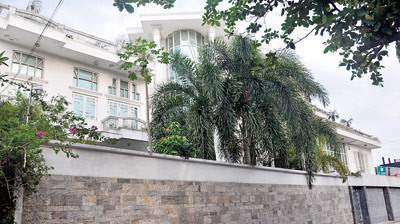News
Thieves strike at multimillion-rupee homes of absentee landlords

The Rs. 700-million property in the centre of the major CID probe into property theft. Pic by Nilan Maligaspe
A well-organised racket targeting properties whose owners are either dead or abroad surfaced this week when police went to court with details of how a Rs. 700 million property in the heart of the capital changed hands through forged documentation.
The four-storey residence in Kollupitiya was not only being illegally acquired but also mortgaged to a private leasing company through forged documentation and a Rs. 150 million loan obtained a few weeks ago, the Criminal Investigation Department (CID) found.
The CID explained to Colombo Chief Magistrate Gihan Pilapitiya on Thursday how a gang allegedly led by a certain Nuwan Chandrasri executed the property transfer through false signatures and other manipulation.
The real owner died last December in India and his wife, who is also an Indian citizen, used to visit Sri Lanka to inspect the condition of the residence, which had two caretakers.
The caretakers are alleged to have made a deal with Chandrasri to prepare a bogus land transfer deed apparently drawn up by a lawyer who is no more. Stolen deeds were used to prepare the fake deeds that in turn were used to obtain the Rs. 150m loan.
Attorney-at-law Sampath Mendis, who appeared for the affected family, questioned how a loan application seeking such a large amount of money could be processed within two weeks when normal applications take longer.
Mr. Mendis told the court help had been obtained from the Land Registry Department to access the original deeds in order to make the fakes and he requested the magistrate to direct police to investigate the matter thoroughly.
The CID shed more light on the racket with the arrest of Rajiv Wickremanayake, Chandrasri’s driver, who is currently in custody. The fake land deed purported to show the land had been transferred to Chandrasri from his driver.
Wickremanayake told the court he would be making a full written confession to the CID.
His lawyer Dasinth Thabrew told the court his client had been forced to sign a document by his employer after initially refusing to be involved in the crime. Mr. Thabrew argued the driver had been employed by Chandrasri but had “no criminal intention”. The suspect was remanded until March 24.

